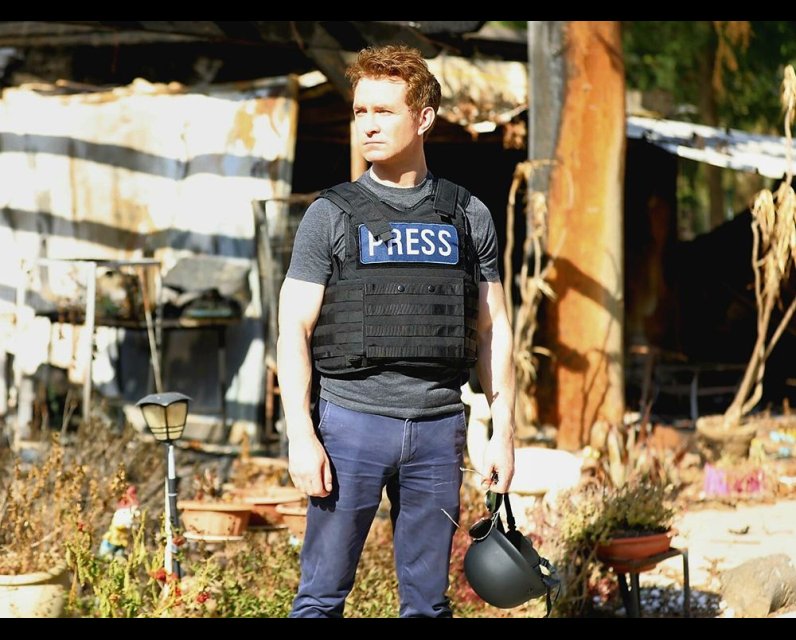Source Feed: National Post
Author: Special to National Post
Publication Date: May 10, 2025 - 06:00
Interview with author Douglas Murray: 'Canada has disgraced itself'
May 10, 2025

Bestselling author of eight books, including The War on The West and The Madness of Crowds, Douglas Murray has just released On Democracies and Death Cults: Israel and the Future of Civilization.
In it, he paints a detailed picture of the minutes, and hours, of the devastation wrought in the Gaza envelope during the massacres of October 7, 2023, as well as the hours, days and months afterwards; the heroism of Israelis who defied orders, and fended off Hamas on their own; the weaponry IDF soldiers discovered in civilian Gazan homes; and the exclusive harrowing accounts of the massacre’s survivors. As one of the first outside observers inside Gaza, he recounts the “pitiful sight” and the “utterly avoidable devastation” triggered by the Hamas-led attacks.
Murray takes a microscope to the question of how modern Jew-hatred has reached unprecedented levels since wartime Europe. That includes the global campus demonstrations that sprung up almost immediately, which he describes as “revolutionary cosplay,” their message communicated with “bludgeoning” — subsequently thanked by a Hamas leader as the “great student flood.” He follows the blood-soaked international money trail that has made Hamas leaders billionaires, and details the global web of Jihad supporters — the “death cults” — as an imminent danger not just to Israel, but to civilization.
Dave Gordon interviews Murray, a columnist for the New York Post and The Free Press, who has for decades filed stories from Middle East war zones, frequently appears on major broadcast channels, and recently had a much-discussed, tension-filled appearance on the Joe Rogan podcast.
What compelled you to write the book?
DM:
Three things. One, was I wanted to get down as accurate an overview as possible, of what happened on October 7 in Israel, by collecting first hand testimony, and much more. The second thing was to give a firsthand account of the Israeli response to October 7, the war, and just get as much as possible up close, an account accurately and truthfully, in an era where much is written a lot about it untruthfully.
And thirdly, to look at this question which haunted me throughout the last 18 months and indeed many years before, which was: why so much of the world finds it so hard to decide which side to be on, in a fight between a democracy like Israel, and a death cult like Hamas?
After October 7, Western democracies doubled down on a two-state solution. Why?
DM
: I think that much of Western policy making has just ended up in the realm of magical thinking in recent years. Put aside whether or not they deserve one, but there’s this completely magical belief that the Palestinians have to get another state, and it will right some great historical wrong. This thinking goes, it would cause an outburst of peace and growth, not just in the Middle East, but in the wider world.
I think they mucked up in Gaza so badly, by now it’s clear that another Palestinian state would just be another terrorist proxy state, another Iranian front state, and that it would have done nothing to improve the lives of anyone in the region or the wider world.
The two state solution paradigm has failed completely since 1948, when Arabs rejected having a state, and rejected ever since, and they only ever responded with violence.
Is this a case where Western leaders don’t want to say the conflict is about jihadism, lest they be seen as Islamophobic?
DM
: Yeah, very weak and dangerous world leaders will quite often try to give themselves some kind of collateral in the human rights bank, by saying how important a two state solution is, and how important another state for the Palestinian people is.
My belief, as I explained the book, is that the “death cult” has the ideology that seeks a downfall, not just of Israel, but of all Western democracies. The triumph of jihadism. The people who think they’re buying themselves time by wittering on about a two state solution are, at best, in denial.
In the book, you mentioned that you spent time in Israeli prisons, face-to-face with Hamas terrorists. What that was like?
DM:
It was to meet, and see for myself, the people who carried out the atrocities and invaded Israel in order to slaughter, rape, kidnap and seek death.
What I really wanted to confront was this question of what this unbelievable evil actually is. And one of the things I say in the book is that I think that we’ve stripped ourselves of the language of evil in the West. In popular culture we speak like: There’s no such thing as evil, we haven’t understood it properly yet, people are misunderstood, or people had a bad childhood, or much more.
But when you stare into evil, what they did on October 7, we need to use this term evil because that’s exactly what it is. People not just engaging in evil actions, but rejoicing positively high on them. Now that is an evil we have seen in the West, in sometimes profound glimpses.
Things like 9/11, the Manchester arena bombing in 2017 (that took 23 lives), Pulse nightclub attack in 2016 (that took 49 lives), the Bataclan massacre in Paris (which took 138 lives.) We’ve seen it, but we’ve tried to turn our eyes away from it, and I wanted to focus the reader on the reality of it.
I’m sure you’ve heard people say that Israel’s PR war has fallen considerably short since the war began. Do you agree? And what could it do differently?
DM
: I tend entirely to disagree. I think Israeli communications has explanation of the actions, of the ideas, much better in this conflict than any previous conflict involving Israel that I’ve covered.
Twenty years ago, getting information out of the Israelis was getting blood out of stone. In this conflict, access to media and information is pretty much real time, and a lot better.
That’s different from whether or not the world wants to accurately report what is happening.
This morning, I opened the BBC website, as I do most mornings, among other media. And you know, despite all the other things going on in the world, there’s story number two about Israel, which is a story which has really no immediate news relevance, and almost always there will be misreporting, deliberate and malicious reporting of Israel’s actions, and deliberately skewed or under-reporting, of the actions of Hamas and their governments of Gaza.
You can criticize Israeli communication strategies as much as you want. But it’s extremely hard to communicate things accurately when most of the world’s media will gleefully report Hamas claims as if they are true and interrogate and misrepresent any actions of the IDF as if they are lying.
This is obviously a big challenge for Israel. The war for public opinion is extremely important. But it’s not as important as the immediate aims of the war, which are the release of the Israeli hostages and the destruction of Hamas.
Maybe if somebody compiled a list of the top 20 thinkers like yourself and a list of the top 20 resources to go to for information about Israel, and hand delivered it to our friends at certain media, and said, “it’s clear that you don’t have this information on hand, now you do. Now there’s no excuses.”
DM:
I’m very fond of the quote of Jonathan Swift, the great Irish-born satirist who said “it is not possible to reason somebody out of the position they were not reasoned into.” And for many people, the Israeli-Hamas war is not something that they feel about because of reason.
I think that’s the same with what I warn about, in On Democracies and Death Cults. I warn about the magical thinking, as well as the bigoted thinking in the West that originates not from reason, but out of anti-reason and out of senses of bigotry and prejudice, ignorance and much more.
That doesn’t mean I’m fatalistic. I think that there’s a lot of good that can be done by actually reasoning people out of positions that they were reasoned into, or would be reasoned into. And I think that’s a very important thing to do. I don’t give up on that. But I think a lot of people in Canadian society and elsewhere in the West, are simply swimming in lumps of bigotry that they may not understand.
I am very keen to bring across, people should notice the order in which the enemies of Israel have their targets. It really isn’t the case that they simply hate Israel. They always hate Israel first, and everyone else in the West next. I can’t think of a society in history that would have tolerated that before now.
That idea of Western society being at risk — do people know what that really means? Would it be more accurate to say they want to kill off liberal values, like a “liberalicide”?
DM:
Yeah, yeah.
People should notice that. For instance, when I’ve been in Canada in the last couple of years, I noticed that the anti-Israel protesters will fly the Palestinian flag, the flag of Hamas or Hezbollah, and various other death cults. They will never fly the Canadian flag.
By comparison when, for instance, last year I spoke at an event for Christians, Jews, Hindus, progressive Muslims and others, which was supportive of Israel, we finished the evening by singing Hatikva and O Canada.
I challenge anyone who thinks that they know what they’re playing with in the “anti” circles, check whether or not any of the Palestinian or Hamas supporters and the anti-Israeli bigots in Canada ever sing O Canada.
They believe that the destruction of a country of 9 million people is possible. But they also want the destruction of the rest of our societies in the West.
Whether or not we continue to fail to identify that, will have huge repercussions, not just on Israel, but Canada, America, and the rest of the West as well.
You’ve embedded yourself in the IDF extensively. How would you answer a critic who’d say you were only getting the Israeli side of the war?
DM:
Well, I’m not only seeing that. I mean, there’s a lot in the book about the Palestinian perspective, and Hamas perspective, and I’ve spent a lot of time with their leadership. But when it comes to embedding, you tend to, in a conflict zone, have to choose a side you embed with.
Some journalists from outside the region have had permission from Hamas to go into Gaza, but it’s extremely limiting, and with my own views of Hamas, they would not welcome me warmly.
When somebody does occasionally raise this question, I’m always struck by the fact that when I’m in Ukraine reporting, as I have done in the last few years, I’ve embedded with Ukrainian armed forces. What I find interesting is that nobody says to me, “why didn’t you hop over the line and embed with the Russian army as well?”
There’s a sort of inbuilt presumption that, unlike reporting from Ukraine, if you report from Israel and Gaza, you are uniquely prone to not reporting the other side. I think that’s flat out wrong. And by the way, in the book, there’s plenty of criticism of the failures of Israeli military and intelligence in the run up to, and obviously on the day of, October the seventh. The book by no means avoids criticism of Israeli failures.
In light of October 7 should there be accountability for the Israeli officials who signed off on the 2005 Gaza disengagement?
DM:
Well, I always think people should be held to account for failures, but they almost never are. It’s unlikely that George W. Bush and members of his government are going to be made to take responsibility for forcing elections on Gaza in the wake of disengagement, when so many people, including in Israel, warned that this would lead to only one thing, which is electing Hamas. One of the reasons there hasn’t been an election in the Palestinian areas of Judea and Samaria in 19 years is precisely because no one wants Hamas elected.
This engagement question is incredibly sore and difficult, because it was obviously the decision of Ariel Sharon. And he was strongly encouraged by the Americans and others in the West, including the sort of know-nothings who go on about the “two state solution” again.
Gazans could have made a lot of it. But as usual, they couldn’t resist deciding that the annihilation of their neighbours was more important than the creation of a state themselves. They prioritized the destruction of Israel over the creation of a viable entity in Gaza.
With rising Jew-hatred, what might be the tipping point for Jewish North Americans?
DM:
It’s extremely hard to say, because everybody has their own early warning system in their heads, in their hearts. All I would say is that many Jews in the West have felt the first time in their lives, the re-eruption of hatred of Jews.
And by the way, nowhere more so than in Canada. To my mind, Canada has disgraced itself in the last 18 months by showing that that anti-Jewish hatred is permissible and is tolerable in a way which hatred of no other group would be.
I would submit that if there were a large number of protests across Canada calling for lynching of black people or Indigenous people or gay people or anything else, that all of the strength of government and civil society would condemn the people doing that. Swiftly, too.
This is the great shame of Canada, that synagogue after synagogue and Jewish school after Jewish school across Canada should have been attacked, fire bombed, shot at. Canada’s politicians, if they care about Canada’s view in the world, should address this. But of course, seems that they’re doing the classic thing of feeding the crocodile.
So what would Prime Minister Carney have to say and do, in your view, to show that he’s truly on Israel’s side?
DM
: First of all, he wouldn’t do the pathetic signalling of talking about a two state solution and revealing, once again, that he knows nothing about the region.
The fact that he did that so early was very telling. He simply wants to feed the crocodile in the hope it’ll eat him last. What he reveals is he knows nothing of what has happened in the region, in particular, in the aftermath of October 7.
What he should do is to make it clear that in a fight between a democracy and a death cult, Canada will be on the side of the democracy. And if thousands of Canadians had been massacred in one day in their homes, and hundreds more taken hostage and held in a terrorist entity next door to Canada, I would like to think that the world sympathies would be with our friends in Canada, and not with the terrorist group who did that to them. But it seems that many Canadian politicians and others would in that situation, expect people to side with the terrorists. I think anyone who does that is showing not only they’re an ignoramus, but they have no moral compass at all.
Why should people pick up the book?
DM:
October 7 was one of the most appalling atrocities of our lifetime, and it’s a warning for people in the West, not just to stare into the face of evil and to understand evil, but to understand the reality of what we could all find someday.
It’s also about what is happening in our own societies in the West, the threat to it, and the opportunity we still currently live in to avoid those threats.
In the end, the book is optimistic. I say, towards the end of the book, I saw a society that after the seventh of October, rose back, and showed that life is a thing worth fighting for, and that in the face of the death cults like Hamas, those of us who value life can win.
This interview was edited for brevity
Our website is the place for the latest breaking news, exclusive scoops, longreads and provocative commentary. Please bookmark nationalpost.com and sign up for our newsletters here.
Four people were injured in a dramatic head-on collision Friday night at the intersection of Jeanne d'Arc Boulevard and Innes Road. Read More
May 10, 2025 - 10:09 | Norman Provencher | Ottawa Citizen
The Royal Canadian Air Force will be flying over the Tulip Festival in Ottawa on Saturday morning. Read More
May 10, 2025 - 09:41 | Paula Tran | Ottawa Citizen
The mysterious disappearance of two young children from their mobile home in the rural Nova Scotia hamlet of Lansdowne has captured headlines around the world. It’s been more than a week since police and search and rescue teams began scouring the thickly wooded land and waterways, searching for any trace of six-year-old Lilly Sullivan and her four-year-old brother Jack.
@media (min-width: 992px) {
.gi-map {
width: 325px;
float: right;
margin: .75rem 0 2rem 2rem;
}
}
!function(){"use strict";window.addEventListener("message",(function(a){if(void 0!==a....
May 10, 2025 - 09:37 | Lindsay Jones, Greg Mercer | The Globe and Mail



Comments
Be the first to comment